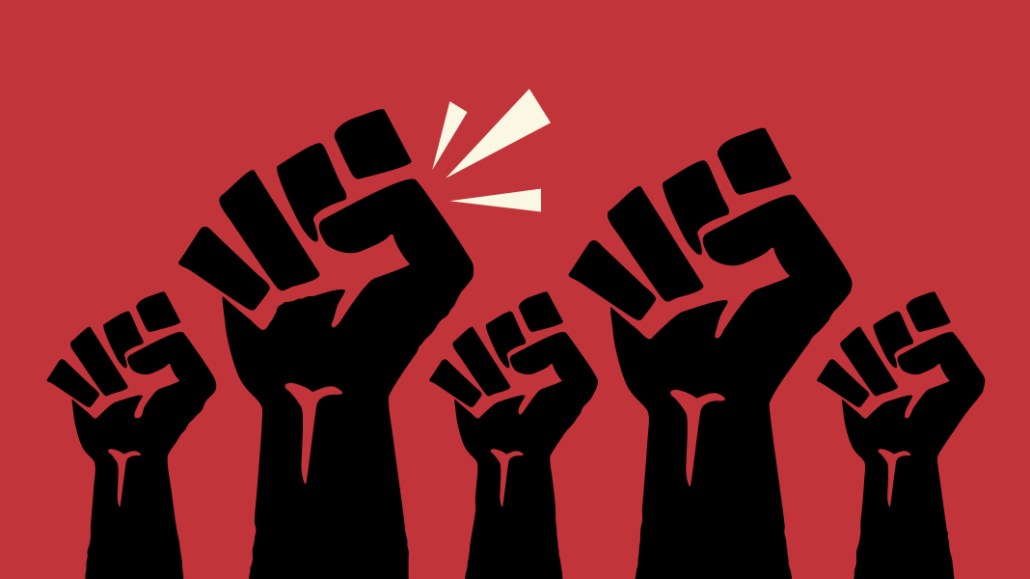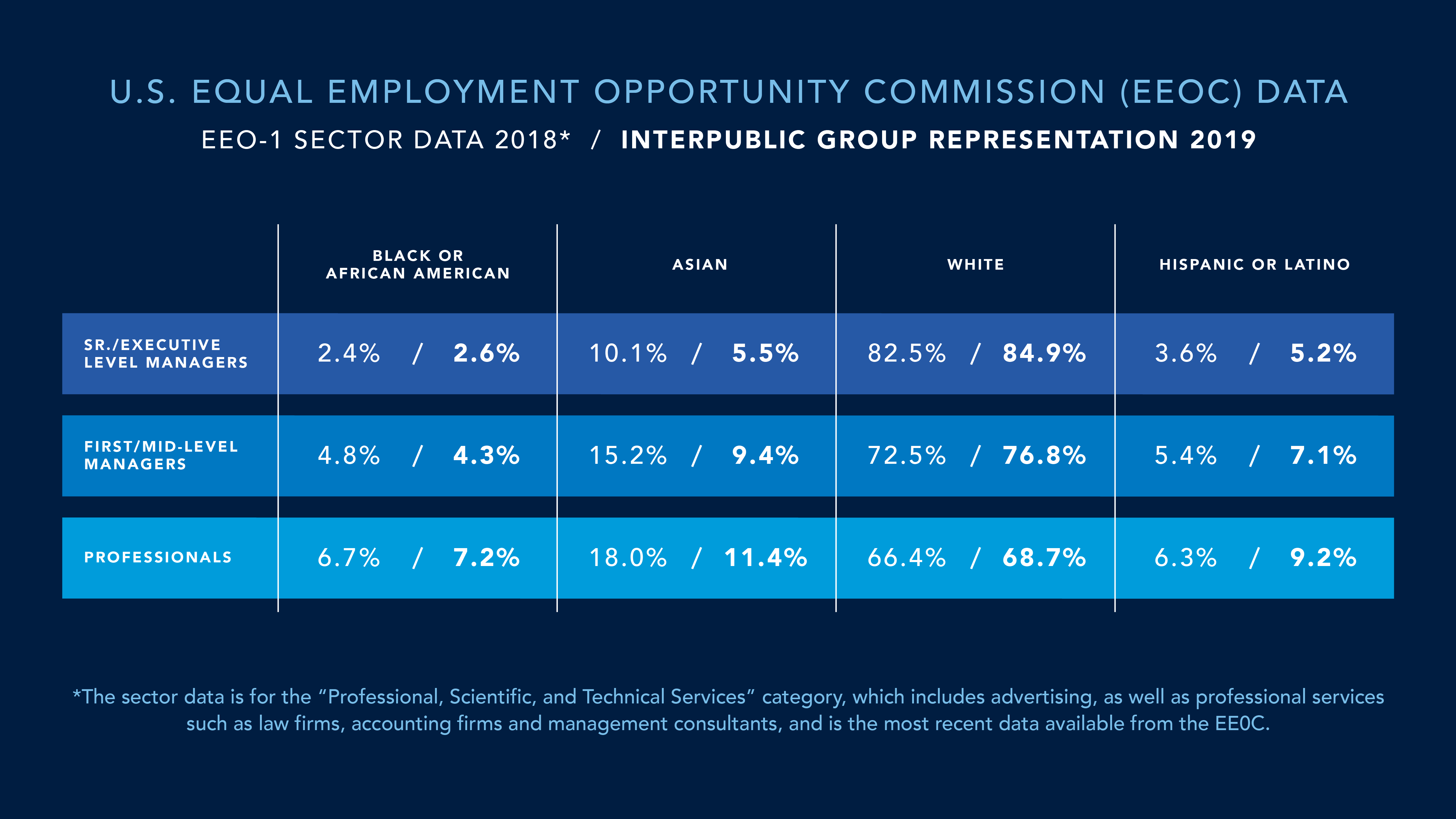Secure your place at the Digiday Media Buying Summit in Nashville, March 2-4
‘Never given a clear path forward’: Black employees say it’s hard to get to middle management at agencies

This Future of Marketing Briefing covers the latest in marketing for Digiday+ members and is distributed over email every Friday at 10 a.m. ET. More from the series →
On Friday, Interpublic Group CEO Michael Roth sent a company-wide memo to employees about what the holding company is doing to “combat systemic racism.” While a note from leadership has been par for the course over the last week or so—agency execs have sent dozens to reassure employees that they will do better and are listening following the nationwide protests against police brutality and systemic racism following the killing of George Floyd by a policer officer in Minneapolis last month—Roth’s note had something new: A transparent look at the diversity of the agency.
In 2019, 2.6% of senior or executive level managers were Black while 84.9% were white; 4.3% of first- or mid-level managers were Black while 76.8% were white; and 7.2% of IPG ad professionals were Black while 68.7% were white. IPG released the data following an open letter to the ad world signed by 600 Black advertising employees calling for change and transparency with regard to diversity data within agencies that was published last week.

Without much hard data until now, much of the discussion of the lack of Black ad executives in middle and upper management has been anecdotal. Still, even without published numbers Black agency execs say it’s obvious. “Look at the leadership pages on most ad agencies’ websites,” said Julianna Akuamoah, chief talent officer at Arnold and Havas Media in Boston. “Take note of the people on your Zoom calls. It’s right in front of us. The data is staring back at all of us every day.”
The IPG data is a first, as holding company agencies famously have not released diversity data publicly. It’s also a concrete look at how few Black employees make it to middle management or to the C-suite at agencies compared to white employees.
Over the past week or so, Black employees at agencies in various roles told me that seeing how few Black people make it to the middle or to the top it’s difficult to plan for a future working at agencies. Some say that their only way up is to leave for other shops while others say that they have to start their own businesses to get management roles.
“I was never given a clear path forward,” said a social strategist who has worked at four different agencies within one holding company and is considering leaving the agency business altogether. “Seeing the same thing at different agencies, it seems like they don’t know how to give feedback to Black employees to help them grow.”
Another strategist echoed that sentiment and said that seeing how “Black people rarely make it to middle management, let alone the top” has her disillusioned with advertising altogether as she’s considering leaving the agency business.
Without being set up for success at agencies, Black employees often don’t make it to middle management. If they do, that’s where they tend to drop out, according to agency executives and industry observers who say that agencies need to make getting to middle management not only more attainable but more inclusive for Black employees to enact real change at agencies.
“I bear personal witness to this,” said Ericka Riggs, foundation and inclusion director at the Ad Club of New York. “Whether conscious or unconscious, the lack of investment, transparency and recognition of the talents Black professionals bring to their organizations is a failure of management.”
That’s not to say agencies are unaware of the issue. Making agencies more diverse and inclusive has been a focus at many in recent years. Still, much of the work to make agencies more diverse has been in fixing a perceived “pipeline” problem in getting Black talent into agencies, but agency execs and employees say the issue isn’t getting Black talent in the door but rather fostering that talent and making sure Black employees aren’t squeezed out in the middle.
“‘The pipeline problem’ has been a bullshit answer,” said Drew Train, co-founder and president at Oberland, adding that agencies need to not only rethink where they are looking for agency talent but address agency culture to help Black talent want to stay at agencies. “Not for nothing but there are lots of Black people in advertising. Talk to the people already in your agency — it’s really not that hard if you try.”
Making agencies more diverse and equitable for Black employees “has to include more than just getting through the door,” said Lanae Spruce, senior director of social strategy and special projects at iOne Digital.
3 Questions with Derek Walker, founder of Brown and Browner
Some people say clients have to push agencies to be more diverse for true change to happen. Do you believe that?
There’s a group of clients that will demand this from their agencies, whether they do it publicly or quietly, I know there’s a group of clients going, “Wait, our agencies aren’t diverse?” General Mills, HP, Facebook and Pepsi have already done this. Now, you’ll see more momentum. [When big clients do something it changes the industry.] Look at what happened when Procter & Gamble and Walmart pushed out payment terms to 120-days — everybody changed. We’ll see some real change and it will be client driven.
When it comes to a lack of diversity at agencies some people say it’s a “pipeline” problem. What do you say?
I have changed my view on pipeline issues. There is a pipeline issue. Here’s why: It’s connected to the wrong source sometimes so you get the wrong output. Or it’s connected to the right source but there are leaks, clogs and obstacles that lead it not into the organization but in and [then] out. What you have are a group of agencies that people know of in the Black community that are famous for taking young Black talent in, chewing them up and spitting them out. Agencies go look, “They won’t stay!” but your pipeline was to the backdoor, it wasn’t up, it wasn’t vertical. People are hiring folks but what they’re doing when they hire them, that’s the important part. None of it leads to the C-Suite.
So the “pipeline” issue isn’t in getting people in the door but moving up?
If you are stellar you will be stuck going around and around the organization but never going any higher than a certain level. Those are some of the issues we haven’t come to address. It’s so much easier to pull in young students. The harder work is to hire someone who one day may replace you. I’ve worked at agencies and then it was like, I got to a certain level and you could go no further. Why would I invite my Black friends, people I know who could do the job, to a place where there’s no advancement? The bigger question for me was: Why would I stay?
More in Marketing

Future of Marketing Briefing: AI’s branding problem is why marketers keep it off the label
The reputational downside is clearer than the branding upside, which makes discretion the safer strategy.

While holdcos build ‘death stars of content,’ indie creative agencies take alternative routes
Indie agencies and the holding company sector were once bound together. The Super Bowl and WPP’s latest remodeling plans show they’re heading in different directions.

How Boll & Branch leverages AI for operational and creative tasks
Boll & Branch first and foremost uses AI to manage workflows across teams.








